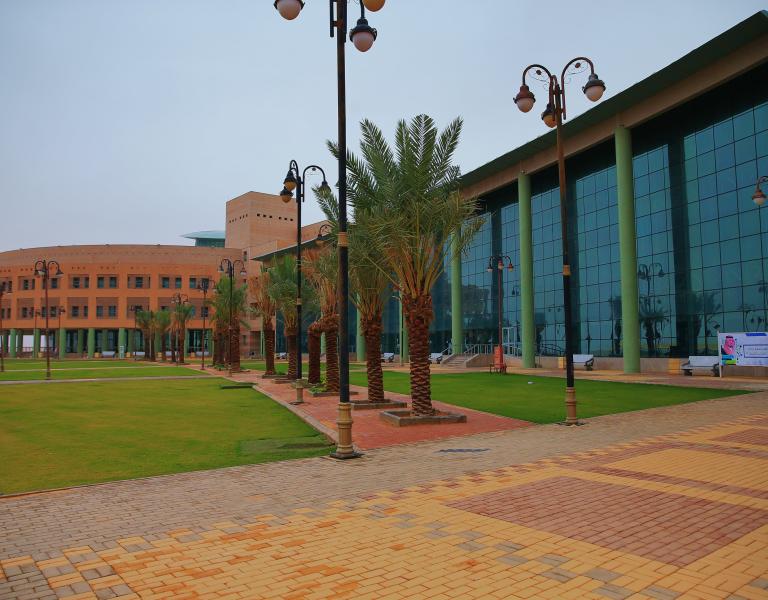About the Department:
Because of the Ministry of Higher Education's efforts to spread higher education in all regions of the Kingdom and its provinces and implementation of the High Order No. 10093/MB and 21/11/1428 H in this regard, the Higher Education Council Resolution No. 20/46/1428 was approved on 2/6/1428 H establishing a Science Department Computers, as one of the scientific departments at the College of Computers and Information Technology. The Department of Computer Science's academic program* takes five years. The program aims to graduate professionals with the ability to manage, analyze, organize, design, formulate, evaluate, and develop technical solutions within institutions' organizational and societal context and focus on providing technical solutions to private and government institutions. The department aims to achieve scientific, research, and practical progress in computer science, especially in computing systems, computer networks, computer programming, and software engineering. We also facilitate practical training using the latest technologies, prioritize understanding social and ethical issues related to computer science, and develop strong communication and problem-solving skills.
Department book
Brief about the program:
Students at Northern Border University (NBU) are eligible for a bachelor’s degree in Computer Sciences after completion of 136 credit hours in four years (quarter system). This includes Graduation Project that is equivalent to 4 credit hours. The minimum cumulative grade point average for graduation is 2.75.
After graduation, the graduate can obtain many job opportunities, for example:
- Software developer or engineer
- Web and smartphone application programmer
- Specialist, designer or database administrator
- Network management and design and network security
- Systems management and systems security
- Management and follow-up of technical support
- Management and follow-up of technical projects
Academic years
Four years divided into 12 semesters:
The first year (the first three levels) represents a general preparation that enables the student to acquire computer, mathematical and English knowledge.
In the second year, the student enters into the core of the specialization through a set of courses that enable him to identify the basic concepts of computer science. The student studies a set of courses in the specialization such as data structures, digital logic design, computer organization and structure, programming languages, applied mathematics for computing, analysis and design of algorithms, and databases. This year, the student can study a free course.
In the third year, the student delves more into the subjects of specialization through a set of courses such as operating systems, computer networks, algorithms and data structures, artificial intelligence, software engineering, building compilers, developing Internet applications and web software, software quality and testing, principles of human-computer communication, security Information, and this year the student can study an elective course from among the college courses.
In the fourth year, the student studies advanced subjects in the specialization in the form of three elective courses and two free courses, in addition to graduation project 1 and 2, through which the student can apply all the knowledge he acquired during the previous years in an applied project.
Program Learning Outcomes (PLOs):
The following Computer Science PLOs are in compliance with the requirements of the Saudi Qualifications Framework (SAQF-2018):-
Knowledge PLOs:
K1: Define and explain the fundamentals of computing and mathematics appropriate to the discipline.
K2: Recognize the best practices and standards and describe their applications.
Skills PLOs:
S1: Analyze a problem and identify the computing requirements appropriate to its solution while being aware of the impact of that solution on individuals, organizations, and society.
S2: Design, implement, and evaluate a computing-based solution to meet a given set of requirements in the context of the program’s discipline.
S3: Use current techniques, skills, and tools necessary for computing practices.
S4: Communicate effectively in a variety of professional contexts.
S5: Apply current technical concepts and practices in the core information technologies and Integrate IT-based solutions into the user environment.
S6: Analyze user needs and take them into account in the selection, creation, evaluation, and administration of computer-based systems by creating and following an effective project plan.
Values PLOs:
V1: Recognize professional, ethical, legal, security and social issues and responsibilities.
V2: Function effectively in teams to accomplish a common goal.
V3: Recognize and explore recent technology as needed, using appropriate lifelong learning strategies.
The following SOs for the Computer Science (CS) program are consistent with the ABET/CAC Student Learning Outcomes for the Computer Science programs:
- An ability to apply mathematical and computer knowledge appropriate to the specialization.
- The ability to identify and analyze problems and choose the appropriate computer requirements to solve those problems.
- The ability to design, implement and evaluate systems, processes and software to meet desired needs.
- Ability to work effectively with a team to achieve common goals.
- Understanding of professional, ethical, legal, security and social issues and responsibilities.
- An ability to analyze the local and global impact of computing on individuals, organizations, and society.
- Ability to communicate effectively with a wide range of audiences
- An ability to analyze the local and global impact of computing on individuals, organizations, and society.
- Recognition of the need for, and the ability to participate in, continuous professional development.
- An ability to apply mathematical foundations, algorithm principles, and computer science theory to systems modeling and design.
- An ability to apply design and development principles in building software systems.
International Accreditation:
The Computer Sciences program is accredited by the International Accreditation Commission ABET (2016 - 2024)
Image

